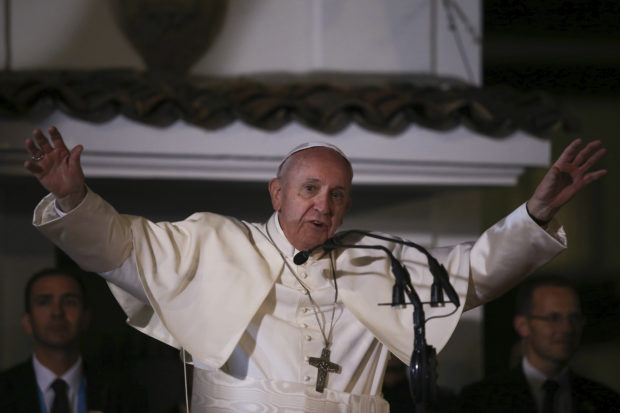
Pope Francis speaks during a meeting with people with disabilities on his second night at the Nunciature in Bogota, Colombia, Thursday, Sept. 7, 2017. (AP Photo/Ivan Valencia)
VILLAVICENCIO, Colombia—Pope Francis heads Friday into an area once besieged by leftist rebels to pray with victims of Colombia’s long conflict and urge them to overcome their grief by forgiving their former assailants.
The highlight of his visit to the central city of Villavicencio is what the Vatican has termed a “great prayer meeting for national reconciliation.” It’s bound to be a deeply emotional gathering for Francis, who has made reconciliation the central theme of his five-day visit to Colombia after promising to visit the country upon the signing of last year’s peace deal with the Revolutionary Armed Forces of Colombia.
The event will be attended by thousands of victims from all walks of life: soldiers who lost limbs clearing land mines, mothers whose children were forcibly recruited by the rebels never to be seen again and farmers driven off their land by right-wing paramilitary groups.
Former rebels are also expected to attend but the Vatican and Colombian organizers have given no indication whether the FARC leadership will be there, or even meet with the pope during his visit, reflecting the freshness of the conflict’s wounds and the sensitivities stirred by any public appearance of former guerrillas still despised by wide swathes of the population.
Among those attending is Lucrecia Valencia, who lost her husband and son, as well has her own right arm and left leg, when they were going out for firewood near their home. Her town was for years engulfed by violence and she says she wants the world to know that the country’s peace is fragile. She says the land mine that upended her life in 2009 was likely planted by another rebel group, the National Liberation Army, or ELN, which remains active in many parts of the country.
“We’re sick of all this,” the 40-year-old said. “I’m a woman of a good heart. I have nothing to ask for. But I want people to know we don’t want any more war.”
Presiding over the event will be a mutilated Christ statue rescued from a bombed-out church 15 years ago—perhaps the most powerful reminder of the senseless political violence that left more than 250,000 people dead and millions displaced. Several Afro-Colombian residents of the impoverished town of Bojaya traveled days by boat, plane and bus to bring the modest plaster statue to Villavicencio so it could be blessed by the pope.
The statue is from a church that was hit and destroyed by a FARC mortar when 300 residents had taken shelter there during a three-way firefight between the rebels, army and the paramilitaries. At least 79 people died and 100 were injured in the 2002 attack.
Today the remote town is a model for reconciliation, having overwhelmingly backed President Juan Manuel Santos’ peace plan and even taken the unusual step of welcoming back the FARC, whose leaders have twice visited the town to seek forgiveness and develop projects to benefit the community.
Earlier at a Mass in Villavicencio, Francis will beatify two priests intimately identified with Colombia’s conflict. The pope said they were killed out of hatred for their faith.
The Rev. Pedro Ramirez was murdered in the turbulent days following the 1948 assassination of a leftist firebrand Jorge Eliecer Gaitan—a slaying that marked the start of Colombia’s descent into political violence and the eventual arming of poor farmers excluded by the elite-driven political system. Priests in the town of Armero, in central Colombia, said Ramirez was pulled from the church, stripped naked and attacked with machetes by an angry mob of Gaitan’s followers who accused him of protecting their conservative, landholding enemies.
Bishop Jesus Jaramillo was gunned down in 1989 in the eastern city of Arauca by rebels from the ELN with whom he clashed on theological grounds. The ELN was founded by priests and seminary students inspired by liberation theology, which sought to identify the church with the poor and excluded, and saw in the conservative but charismatic Jaramillo a potential rival for influence among the region’s peasants and workers.
Villavicencio is also a choice location to reflect another of the pope’s concerns on his visit to Colombia: the environment.
Lying on the edge of the Amazon rainforest, the one-time backwater was transformed by an economic boom as the winding down of the conflict and a spike in commodity prices drew oil companies and multinational agricultural interests to areas that were previously off limits. With peace, the land grab is expected to intensify, straining even further Colombia’s delicate environment — one of the world’s most biodiverse, with more bird species than any other country.
Before leaving Francis, who has warned that today’s “structurally perverse” economic system risks turning Earth into an “immense pile of filth,” will plant a tree at the cross of reconciliation as a sign of new life, thus joining the environment with the main theme of his pilgrimage to Colombia. JPV